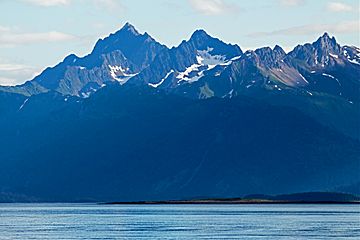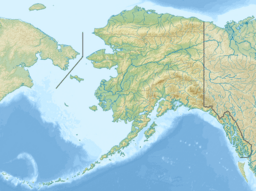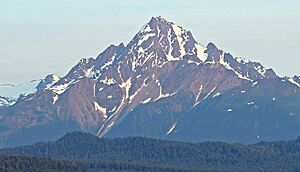Mount Case facts for kids
Quick facts for kids Mount Case |
|
|---|---|

Mount Case (left of center) from southwest
|
|
| Highest point | |
| Elevation | 5,545 ft (1,690 m) |
| Prominence | 4,600 ft (1,400 m) |
| Isolation | 6.4 mi (10.3 km) |
| Geography | |
| Location | Glacier Bay National Park Hoonah-Angoon Alaska, United States |
| Parent range | Alsek Ranges Saint Elias Mountains |
| Topo map | USGS Juneau D-6 |
| Climbing | |
| First ascent | 1965 by David P. Johnston, Pete Robinson |
| Easiest route | Climbing North ridge |
Mount Case is a tall mountain peak in southeast Alaska. It stands about 5,545 feet (1,690 meters) high. This mountain is part of the Alsek Ranges within the larger Saint Elias Mountains.
You can find Mount Case inside Glacier Bay National Park and Preserve. It's the highest point between Adams Inlet and White Glacier. The mountain is about 65 miles (105 km) northwest of Juneau. It's also close to another peak called Mount Wright.
Even though Mount Case isn't one of the world's tallest mountains, it rises very steeply from the water. It goes from sea level to its peak in less than three miles. This makes it stand out a lot from the land around it. In fact, it ranks as one of the top 75 peaks in Alaska for how much it stands out.
The mountain got its name in 1890 from Harry Fielding Reid. He was an American scientist who studied glaciers in Glacier Bay. Reid named the mountain after his school, the Case School of Applied Science, in Cleveland, Ohio.
The best time to visit or see Mount Case is usually from May through June. If the weather is clear, you can often see Mount Case from Glacier Bay. This area is a very popular spot for cruise ships.
What is the Climate Like at Mount Case?
Mount Case has a subarctic climate. This means it has cold, snowy winters and mild summers. Temperatures can drop very low, sometimes below −20 °C (or −4 °F). With the wind, it can feel even colder, below −30 °C (or −22 °F).
This cold climate helps keep the White Glacier below the mountain's south side. All the rain and melted snow from the mountain flows into Glacier Bay Basin.
 | Lonnie Johnson |
 | Granville Woods |
 | Lewis Howard Latimer |
 | James West |



